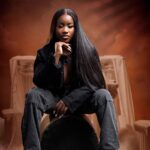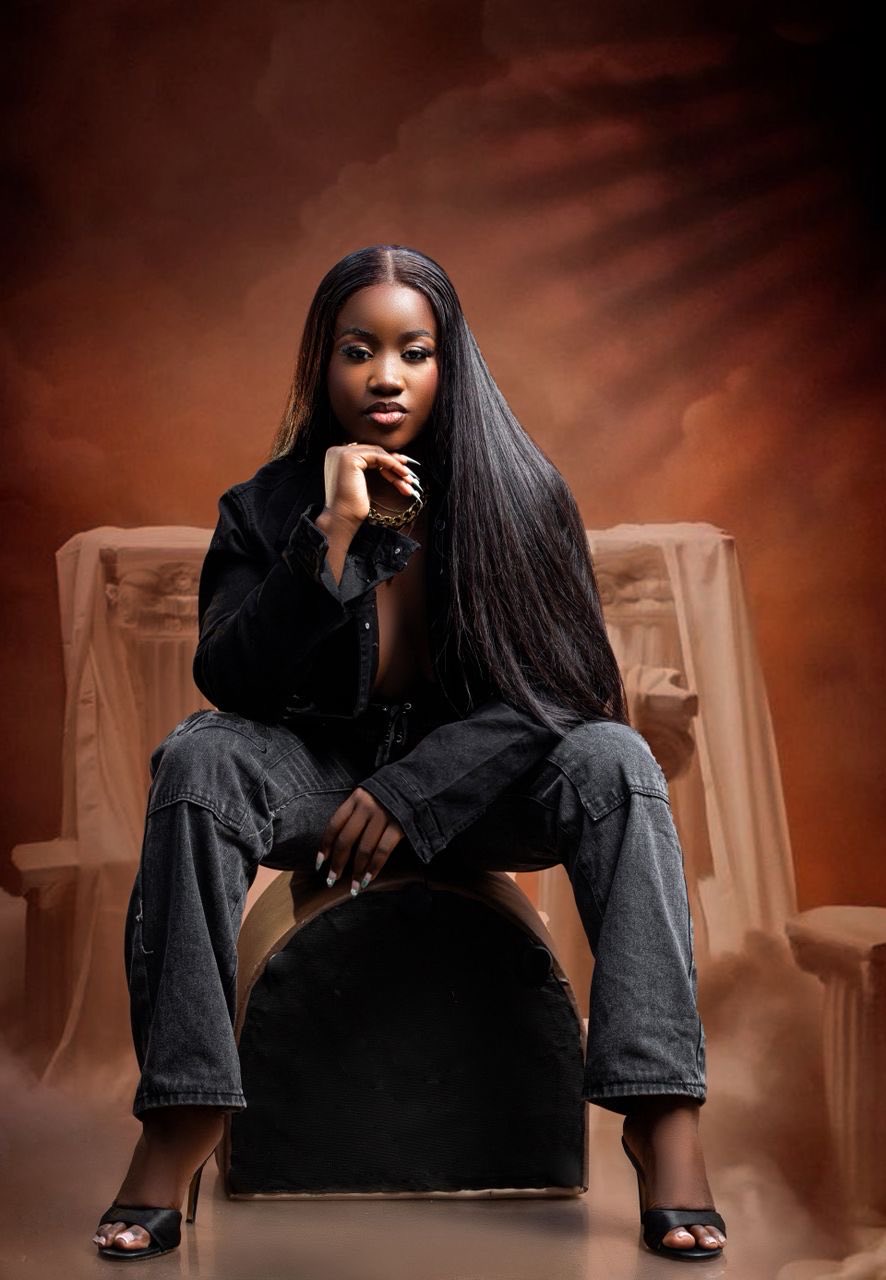
Ghanaian Afropop and R&B singer, Gyakie spent three years readying her debut album — one which she feels carries the potential for healing and more collaboration.
As Ghana’s foremost R&B voice and a loyal steward of her roots, it makes sense that Gyakie’s first release after months of quiet was a heart-on-sleeve track.
Partly delivered in her native Twi, its “Sankofa” — which translates to “go back and get it” in English — can be read as a metaphor for what Gyakie intends with her debut album, After Midnight.
Gyakie believes that a “true” debut album is a monument to an artist’s growth — one that can only be built when the foundation is solid. Hence, After Midnight is the culmination of years of meticulous work and reflection.
Once the clock struck midnight on Aug. 29, listeners can similarly reflect on everything Gyakie has been and promised to be: true, tender and transcendent.
The daughter of revered highlife musician Nana Acheampong, Gyakie clearly has her own uniquely magnetic appeal within the rising vanguard of Afropop. Her discography, though relatively slim, is weighted with purpose and has garnered a steady swell of listeners across Ghana, Nigeria, and beyond.
The 2020 Seed EP announced her as a voice of power, led by the runaway success of “Forever,” which landed an even bigger remix with Nigerian artist Omah Lay. Two years later came My Diary, a compact but vivid collection that expanded her range, featuring a collaboration with Davido. Now, after a patient, three-year gestation, and an almost preternatural sense of timing, the “Song Bird” — as she’s fondly called — stands at the precipice of her next great chapter.
Ahead of the album’s release, Gyakie spoke with GRAMMY.com about making a record that carries the potential for healing and her hope that it will become a legendary one.
What made this the right moment for your debut album?
I’ve always said that everything around this work, aside from being very deliberate and carefully planned, is also guided by feeling. Sometimes you just sense when it’s the right time to do something.
I always wanted to make an album, but I knew it would only happen when the moment truly felt right. The idea [for After Midnight] came about three years ago, and that’s when we began working on it.
But it’s taken three years because every time we were ready to release it, something didn’t feel quite right. We would always go back and make a few adjustments. Here we are in 2025, and it finally feels like the perfect time for it to come out.
What is the central thesis of the album, as suggested by its title, After Midnight?
Everything that happened in my creative process — from the beginning of the album until it was finalised — took place within those late hours. Time is really the main theme I wanted to focus on because the majority of the tracks were created in studio sessions that started after midnight.
Most of these sessions happened when I was in a particular mood or a specific headspace, and because of that, many of the songs have distinct backstories. I went back to the 2019 version of myself, the Gyakie that people first connected with and the sound that many listeners fell in love with. It covers love. It covers life. I really targeted the soul with this project.
There are two songs on the album meant to motivate anyone who may be feeling less than themselves, and that too is rooted in emotion. There is also a gospel track that draws from the same emotional depth. Even the party songs touch on people’s feelings in a way that connects with their souls.
You went back to the 2019 Gyakie, to the sounds you had established and your fans love. But did you aim to push the needle by exploring new genres?
Yes, absolutely. The album contains Afrobeats, as well as R&B, dancehall, hip-hop, Afroswing, and gospel.
This album made me realize that I have an interest in production because I co-produced some tracks. Last year I thought the project was complete, but when I listened to all the songs again, I knew there were tiny missing pieces in the production. We went back to the drawing board, dissected every track, and decided what needed to be adjusted.
There’s a track called “Y2K Luv” that took us a long time to finish. It’s an old-school hip-hop track, and although I’ve made hip-hop songs before, I hadn’t released anything with that particular sound till now. Over the years, I’ve grown and matured as regards to how I create and write music, and how I approach production. I’ve learned so much, and I’m glad I’ve been able to put that growth into this work.
When it comes to lyrical dexterity and depth, how exactly have you grown? Do we hear it on this album?
In the past, when I wrote about my personal experiences, I tended to hold back. But at this point in my career, I’m extremely real about what I say. I’m having direct and honest conversations. There are things I might never feel comfortable saying in an interview or in public, but in a song, I can say them. It’s quite glaring on the record.
After Midnight helped me to stop hiding. I know my fans pay attention to the lyrics, so that’s where I get to have the most vulnerable conversations with them. I speak about love, pain, reconciliation, basically all the stuff I used to try to shroud.
You’ve brought some interesting names onto this project: 6lack, Headie One, Young Jonn, Shatta Wale who’s a legend in Ghana. How cool was it to finally work with him?
In Ghana, when it comes to dancehall and reggae, Shatta Wale is one of the first names people mention. He’s done so much for the industry. After I recorded “Harmattan,” I felt it needed someone else, and his was the first voice I imagined on it. We sent the track to him, and I could tell that he loved it because he put so much effort into his verse.
I remember speaking with him on the phone, and he told me how much he enjoyed recording it and how good he thought the song was. I’m really grateful he gave his best.
What I love about this album is that every collaboration came from a genuine need to connect, so it all felt natural — you can hear that these are people who really wanted to make music together.
Sometimes with collaborations, it can be strictly about doing your part. But on this project, it was different. These are friends who respect my music and I respect theirs. They loved the songs so the process was easy and it made the music even sweeter.
Looking at how big these artists are in the industry, it means a lot that they chose to be part of my music. It’s never easy to send a track to someone at that level and have them agree, no matter how good you are. The fact that they believed in the songs and wanted to contribute tells me I’m doing something right.
With Ghana at the centre of a cultural and musical renaissance, where does After Midnight sit?
The moment you hit play on the album, the intro begins with traditional drums from my hometown, Kumasi, in the Ashanti Region of Ghana. My father, Nana Acheampong, has a record that is still doing incredibly well, and I sampled it in the intro of the project. In the album trailer, we included cultural dances and images of artists I grew up listening to, both from Ghana and beyond. Those details are intentional, because I wanted this project to reflect where I come from and the sounds that shaped me.
At the same time, After Midnight is my debut, and because it took three years to finish, I was able to pour in everything I’d learned during that time. I did a lot of research, listened widely, and studied performances and visuals, which pushed me to experiment and bring different influences into the music. I wanted the album to live across several sonics and aesthetics. So for me, After Midnight is rooted deeply in Ghana but also versatile enough to sit in global conversations.
A debut album is the first major pillar of an artist’s legacy. What is your biggest hope for yours?
As an artist, no matter how many albums you release, people will always trace your journey back to your first. My biggest hope is for After Midnight to do really well. I want this to be a legendary project, one that people will still talk about decades from now. I truly believe I put in a lot of work and made these songs with great care so this project deserves to succeed and open bigger doors for me.
The album holds everything — musically, visually, and culturally — across its 17 tracks. In any space where these are mentioned, at least one or two tracks from After Midnight will find their place.
Here is the cover art and official tracklist of “After Midnight” below.
official ARTWORK for my debut album “AFTER MIDNIGHT” 29/08/25 🐦 pic.twitter.com/0pKq2ops2l
— After Midnight (@Gyakie_) August 18, 2025
TRACKLIST FOR MY ALBUM “AFTERMIDNIGHT” see u on 29/08/25. 🐦 pic.twitter.com/9ksBMiyINu
— After Midnight (@Gyakie_) August 26, 2025













